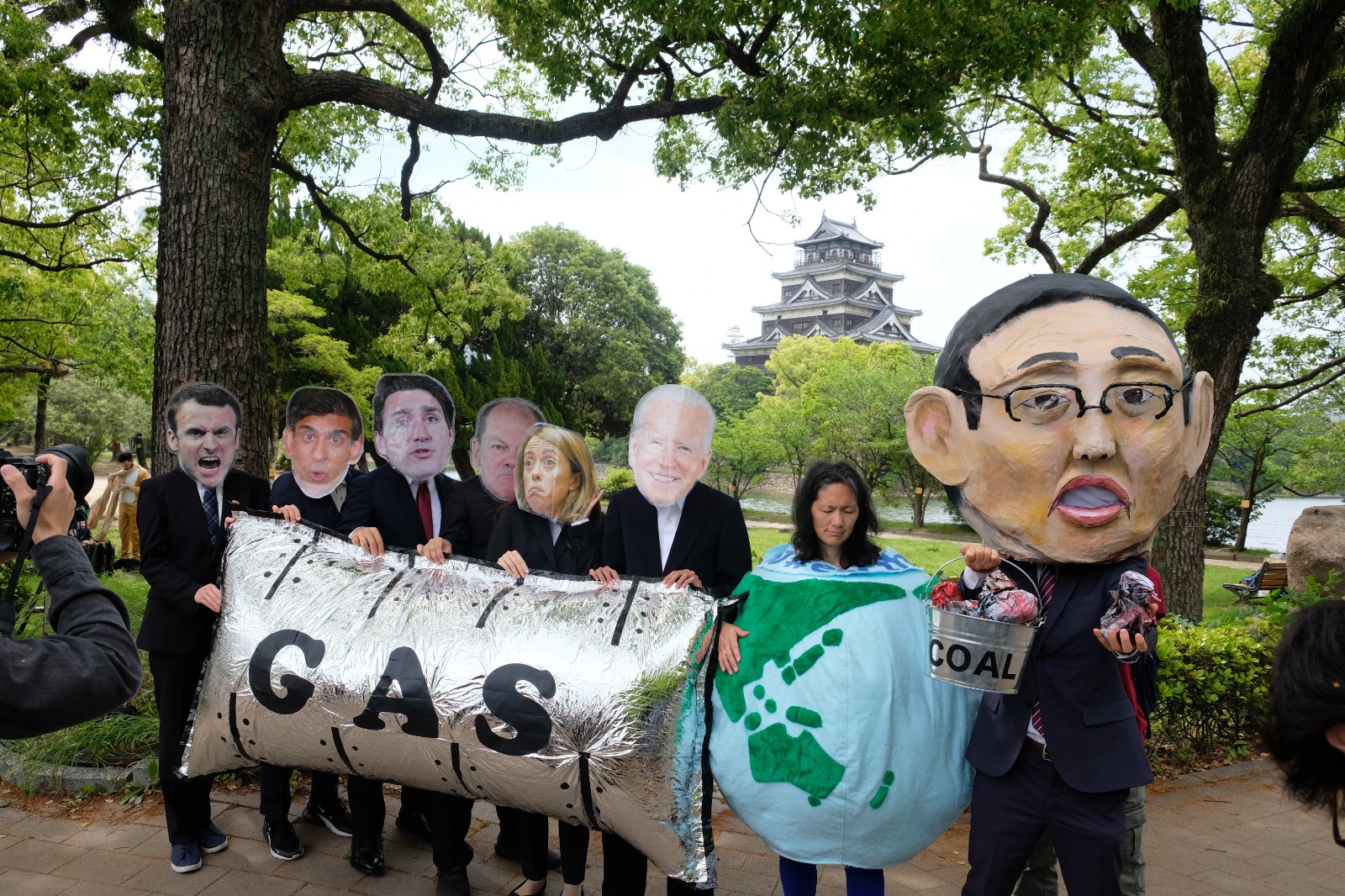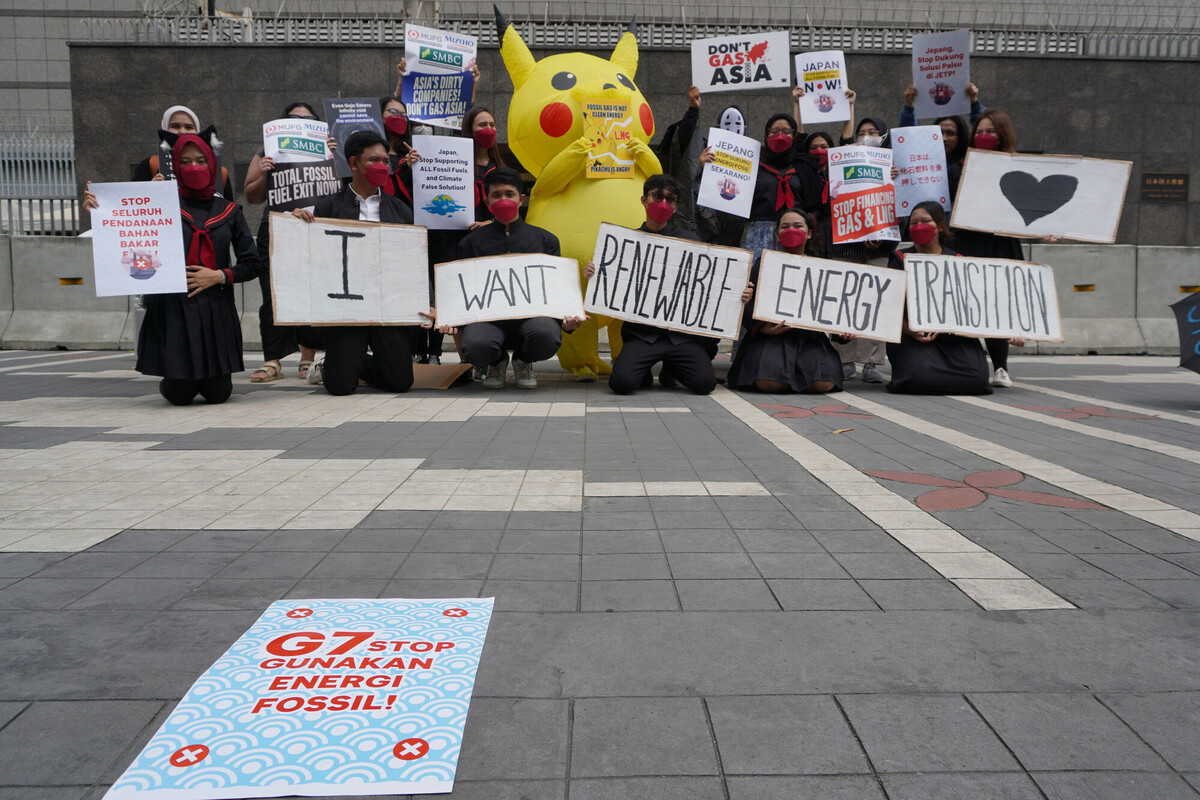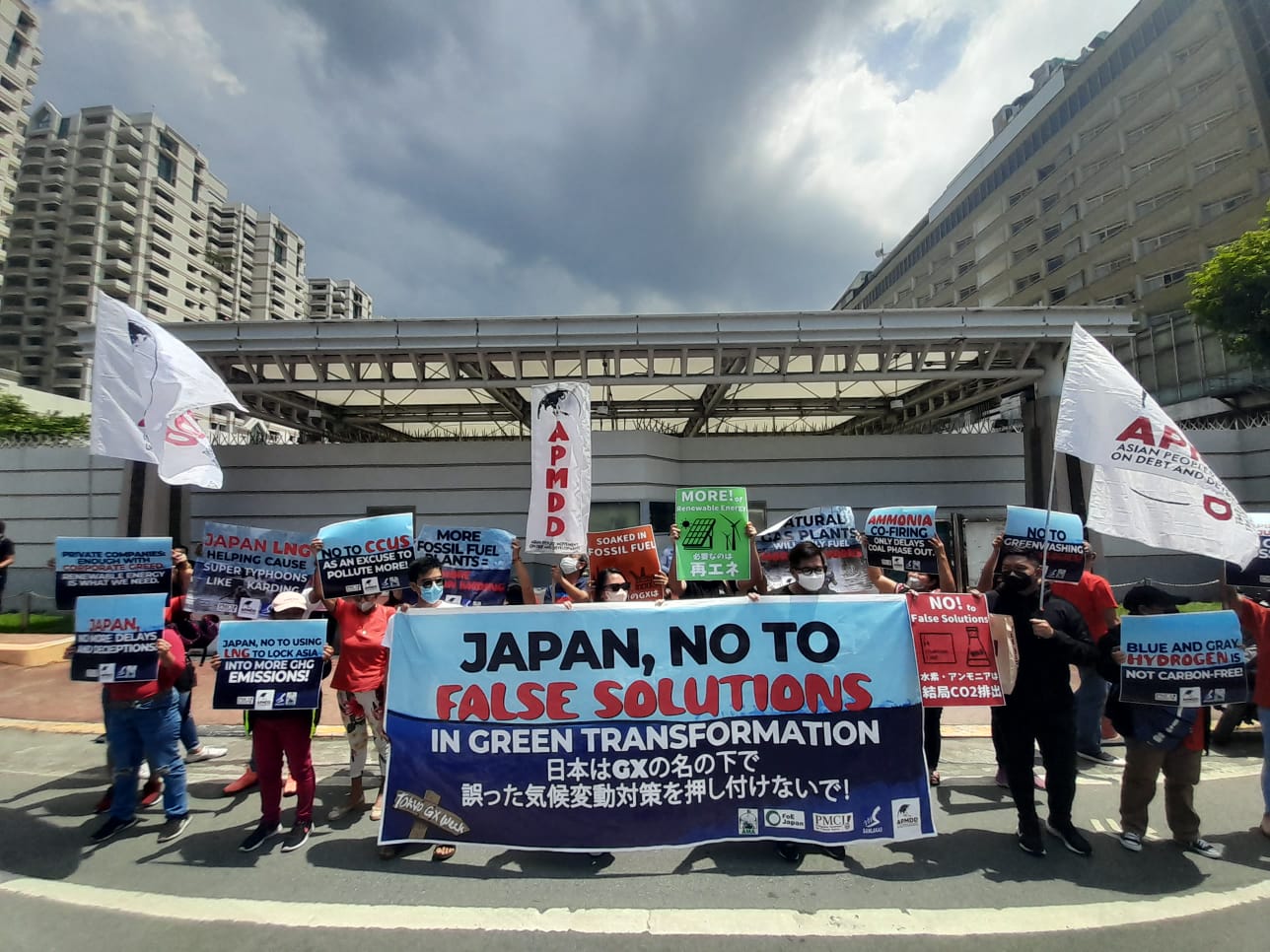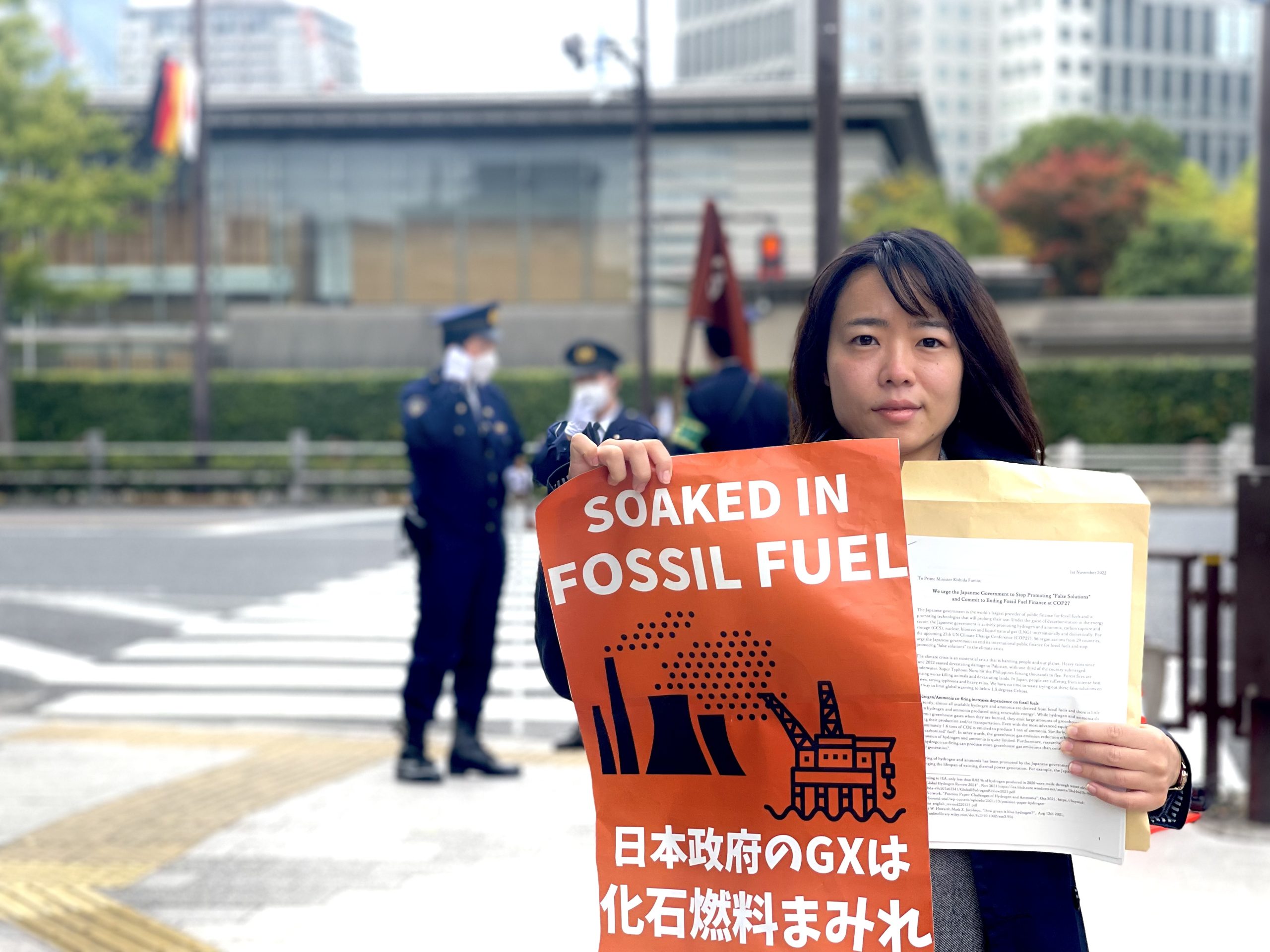Open Letter: G7 countries must not leave room for fossil fuels, climate destruction

(Photo credit: 350.org Japan)

(Photo credit: Melvinas Priananda / Trend Asia)
Climate, human rights, and energy advocates of 180 groups from 27 countries called on G7 countries to scrap fossil fuel financing in climate-vulnerable nations as the leaders from the most powerful economies are going to meet in Hiroshima this week.
Below is the text of the open letter.
G7 countries must not leave room for fossil fuels, climate destruction
[1] This is an updated text of civil society organizations’ call for G7 countries to reject the rollout of false energy transition technologies issued last April 14, 2023.
May 16, 2023
To the Presidents, Prime Ministers, and Climate, Energy, and Environment Ministers of Japan, the United States, Britain, Canada, France, Germany, Italy, and the European Union:
As world leaders meet for the G7 Leaders Summit this week, We, the undersigned 180 organizations and supporters from regional and global movements and networks from 27 countries, are raising our demand for powerful nations to stop peddling fossil fuels to developing countries. Climate and energy ministers fell short of their commitment to end fossil fuels – leaving the door open for investments in new fossil gas infrastructure and fossil fuel-based technologies heavily promoted by G7 host Japan.
A glaring text in the G7 Climate and Energy Ministers’ Communique, “low-carbon and renewable hydrogen and its derivatives, such as ammonia should be developed," solidifies Japan’s efforts to use its position as G7 host to internationalize its fossil fuel and ammonia-heavy strategies under Green Transformation (GX) policy, which will mobilize over USD1.1 trillion in public and private capital over the next 10 years to overhaul 22 industrial sectors in Japan and provide partner countries with Japanese technology and finance.
We reiterate that what Japan calls a “realistic energy transition" derails efforts for a just energy transition as GX heavily relies on the use of fossil fuel-based technologies, including liquified natural gas (LNG), the co-firing of ammonia, hydrogen, and biomass at existing fossil thermal plants, and carbon capture and storage. Experts say, for instance, in Thailand, Philippines, Indonesia, and Malaysia, even if coal and ammonia are burned in equal amounts – an impossible feat with today’s technology – emissions would still be similar to that of gas-fired power stations, which must be phased out rapidly to decarbonize the power sector.
While ministers succeeded in pushing back against Japan’s push for natural gas and LNG, the Communiqué does not meet the condition under the IEA’s 1.5°C scenario, which shows that no new gas fields should be developed. At the same time, LNG projects already under construction should remain unutilized, and existing LNG capacity needs to be decommissioned early. Moreover, the lack of a deadline to end coal and the language of retaining “fully" and “predominantly" decarbonizing the power sector show weak signals of rich nations’ leadership.
We continue to demand clarity and more robust commitments on G7 countries’ plans to assist other countries in scaling up their energy transition and energy efficiency despite last year’s groundbreaking G7 commitment to end international public finance for fossil fuels by the end of 2022. The Communiqué claims that the G7 has met this commitment and has “ended" their international fossil fuel finance, but Oil Change International (OCI) analysis shows this is untrue. New OCI analysis shows that between 2020 and 2022, the G7 poured USD73 billion in public finance into new fossil fuel projects, 2.6 times their support for clean energy over the same period. While the UK, Canada, and France have delivered their commitment to ending this fossil fuel finance, Japan, Italy, and Germany have not. The US claims it has delivered on its commitment, but its fossil fuel finance policy is not publicly available.
Over the past month, we have seen Japan ignore some G7 nations’ pushback against fossil fuel-based technology as Japan’s Prime Minister, Fumio Kishida, peddled these false solutions to more Global South countries by promoting fossil fuel-heavy energy strategy in Africa. Reports also show that Germany continues to push for G7 leaders to endorse public investment in the gas sector, while US President Joe Biden recently broke a major climate promise to end public finance for fossil fuels, with the United States Export Import Bank (US EXIM) voting this week to provide almost USD 100 million in export finance to expand the PT Kilang Pertamina Balikpapan Petroleum Refinery in Indonesia. These contradict the Ministers’ agreement “to accelerate the phase-out of unabated fossil fuels to achieve net zero in energy systems by 2050 at the latest in line with the trajectories required to limit global average temperatures to 1.5°C" and ending “public support for the international unabated fossil fuel energy sector in 2022."
The G7 Leaders Summit will be crucial for the world’s most powerful nations to show climate leadership. G7 must translate words into concrete actions supporting the energy transition in developing countries. The time for vague commitments is long over.
Therefore, we call on the presidents, prime ministers, and climate, energy, and environment ministers of Japan, the United States, Britain, Canada, France, Germany, Italy, and the European Union to uphold their commitments from the last G7 summit and follow through with the following demands:
Reject Japan’s push for false energy transition solutions. According to Transition Zero, Japan’s mammoth USD1.1 trillion – financing on ammonia, hydrogen, nuclear, and carbon capture and storage through Green Transformation (GX) will not help attain net zero in Southeast Asia. Most ammonia and hydrogen are produced from fossil fuels including methane emissions vented throughout the gas lifecycle. Ammonia co-firing, one of the technologies Japan is pushing for in Southeast Asia, needs to cut emissions more to reach net zero in Indonesia, Malaysia, Thailand, and the Philippines, even with the most technologically feasible co-firing rate (20% ammonia-80% coal). Ammonia produced from renewables should be saved for the hard-to-abate sectors, such as long-haul shipping.
The critical 1.5-degree Celsius Paris Agreement threshold will be at risk if Japan successfully pushes the wrong technology in Asia. Thus, Japan must not be allowed to peddle its dirty energy strategy for Asia with its false solutions, which are nothing but greenwashing lies.
End financing for all fossil fuels including fossil gas, and agree to a time-bound commitment to phase out all fossil fuels. The International Energy Agency has said no “new oil and natural gas fields are needed" in the 2050 net-zero pathway. Furthermore, the IEA has declared that the golden age of gas is over. We can see this play out in Asia, as Russia’s invasion of Ukraine has destroyed the growth of gas demand in the region due to skyrocketing prices and supply uncertainty.
Yet, Japan, France, the UK, the US, Germany, and Italy are among Southeast Asia’s top financiers of post-Paris Agreement fossil gas projects. Developing more fossil gas plants and terminals is not just delaying climate action. It is also putting biodiversity and people’s livelihoods at risk. We reiterate that fossil gas is not a transition fuel. Instead, it is a risky and dangerous investment that will lock developing nations into decades of stranded assets, debt traps, and emissions.
Commit to a fair and just mechanism to provide funding for the energy transition. Continued investments in fossil fuels create increased risks of stranded assets and shortfalls in government revenue as competition with cheaper and cleaner alternatives, such as solar and wind, grows and demand for fossil fuels declines. We urge G7 leaders to take advantage of investment opportunities in clean energy and promote a just and equitable transition away from all fossil fuels.
The recent IPCC Synthesis Report was clear: the surest path to avoiding climate catastrophe is to phase out fossil fuels. Greenhouse gas emissions must be cut by almost half by 2030 to come in at or below the 1.5˚C limit, with further reductions to follow. This means all financing mechanisms, such as JETP and ETM, must not include fossil-based solutions consistently.
People worldwide are also raising our demands to ensure our communities are protected from the economic and environmental consequences of fossil fuel dependence. As the window for crucial and meaningful actions narrows, the global movement against fossil fuels is widespread and will only get stronger.
There’s no room for false energy transition solutions in developing nations. The world needs a clear, just, and equitable energy transition mechanism anchored on renewable energy. As powerful nations, G7 must commit to actions to phase out fossil fuels and ramp up renewable energy. A realistic energy transition must address the reality that the climate crisis requires ambitious and people-centered actions toward a real-zero pathway.
Sincerely,
REGIONAL & GLOBAL MOVEMENTS AND NETWORKS
Asian Energy Network(AEN)
Asian Peoples’ Movement on Debt and Development (APMDD)
Big Shift Global
Climate Action Network Southeast Asia
EarthRights International
Friends of the Earth – Asia/Pacific
Friends of the Earth – International
Focus on the Global South
Global Forest Coalition (GFC)
Greenpeace Southeast Asia
International Accountability Project (IAP)
International Rivers
NGO Forum on ADB
Oil Change International (OCI)
Rivers without Boundaries Coalition
Recourse
Say No to LNG!
350 Asia
AUSTRALIA
Friends of the Earth
BANGLADESH
350.org Bangladesh
Bangladesh Adivasi Samity
Bangladesh Poribesh Andolon (BAPA)
Bangladesh Bacolight Shramik Federation
Bangladesh Bhasaman Nari Shramik
Bangladesh Bhasaman Shramik Union
Bangladesh Chattra Sabha
Bangladesh Environmental Lawyers Association (BELA)
Bangladesh Jatyo Shramik Federation
Bangladesh Krishok Federation
Bangladesh Kishani Sabha
Bangladesh Krishok Sabha
Bangladesh Bhumiheen Samity
Bangladesh Rural Intellectuals’ Front
Bangladesh Sangjukto Shramik Federation
Bangladesh Shramik Federation
Charbangla Bittoheen Samobay Samity
COAST Foundation
Emarat Nirman Shramik Bangladesh
EquityBD
Ganochhaya Sanskritic Kendra
Jago, Bangladesh. Garment Workers’ Federation
Motherland Garment Workers’ Federation
Progressive Peasants’ Council
Ready Made Garment Workers’ Federation
SDG Action Alliance Bangladesh
Voices for Interactive Choice and Empowerment (VOICE)
Waterkeepers Bangladesh (WKP)
Youthnet For Climate Justice – Youthnet Global
BOLIVIA
Reaccion Climatica
CHILE
Fundacion Chile Sustentable
CHINA
Blue Dalian
Green Longjiang
Snow Alliance
Scholar Tree Alliance
ECUADOR
Coordinadora Ecuatoriana de Organizaciones para la Defensa de la Naturaleza y el Medio Ambiente – CEDENMA
FINLAND
EKOenergy ecolabel
GERMANY
Urgewald (Germany)
GHANA
AbibiNsroma Foundation
INDIA
All India Women Hawkers Federation (AIWHF)
Conservation Action Trust
Environics Trust
GrowthWatch
Himalaya Niti Abhiyan (HNA)
Indian Social Action Forum – INSAF
Minerals and Inheritors Rights Association (MIRA)
Nadi Gadi Morcha (NGM)
National Hawker Federation (NHF)
Poovulagin Nanbargal
River Warrior Indonesia (REWIND)
INDONESIA
350.org Indonesia
Aksi! for gender, social and ecological justice, Indonesia
Aksi Ekologi & Emansipasi Rakyat (AEER), Indonesia
Aliansi Zero Waste Indonesia
Brantas River Waterkeeper,
Ecological Observation and Wetlands Conservation (ECOTON)
Enter Nusantara
Green Partner Foundation (Yayasan Mitra Hijau/YMH).
Gerakan Indonesia Diet Kantong Plastik
Institute for Essential Services Reform (IESR)
Jaringan Nasional Advokasi Pekerja Rumah Tangga (JALA -PRT)
Koalisi Rakyat untuk Hak atas Air (KRuHA)/ People’s Coalition for the Right to Water
Koprol Iklim
Nexus3 Foundation
Satya Bumi, Indonesia
Trend Asia
Wahana Lingkungan Hidup Indonesia (WALHI/Friends of the Earth Indonesia)
Yayasan Srikandi Lestari
ITALY
ReCommon
JAPAN
Friends of the Earth Japan
Japan Center for a Sustainable Environment and Society (JACSES)
Kiko Network
Mekong Watch
LAOS
Green Vientiane
MALAYSIA
Environmental Protection Society
Sahabat Alam Malaysia (SAM) – Friends of the Earth Malaysia
MYANMAR
Karen Environmental Social Action Network (KESAN)
Karen Rivers Watch (KRW), Myanmar
Save the Salween Network (SSN), Myanmar
Thant Myanmar
MONGOLIA
Oyu Tolgoi Watch
Ecosoum NGO
NEPAL
Digo Bikas Institute (DBI)
NETHERLANDS
Just Finance International
PAKISTAN
Agrarian’s Collective Pakistan
Akhuwat Kissan
Anjuman e Muzareen e Punjab
Cholistan Development Council
Clean and Green Khai
Climate Activists Collective
Community Developers Association (CDA)
Crofter Foundation
Feminist Collective Pakistan
Gilgit-Baltistan Social Welfare Organization
Haqooq e Khalq Movement
Home Net Pakistan
Indus Consortium for Humanitarian, Environment and Development Initiative
Kissan Ikkat
Kissan Karkeela
Kissan Ravi Club
Labour Education Foundation
Labour Qomi Movement
Pakaid
Pakistan Kissan Rabita Committee (PKRC)
Pakistan Fisherfolk Forum (PFF)
Pakistan Institute of Labour Education and Research (PILER)
Policy Research Institute for Equitable Development (PRIED)
Progressive Student’s Collective
Sanga
Sawera Foundation
Sindh Hari Porchat Council
Sustainable Development Policy Institute (SDPI)
Tameer e Nau Women’s Worker Organization
Textile Powerloom Garments Workers Federation
Vision Building Future
Visionary Forum
Young Reformers
PHILIPPINES
Aniban ng Mangagawa sa Agrikultura (AMA)
Angat-GenC – Generation Climate
Atimonan Power for People
Break- free Pilipinas, Break – free from Fossil Gas – Philippine Campaign
Bukluran ng Manggagawang Pilipino (BMP-Workers Solidarity)
Camarines Norte Movement for Climate Justice
Center for Energy, Ecology and Development, Philippines
Center for Renewable Energy and Sustainable Technology
Concerned Citizens of Sta. Cruz , Zambales
Gitib, Inc.
Initiatives for Dialogue and Empowerment through Alternative Legal Services (IDEALS, Inc)
Justice, Peace and Integrity of Creation Commission-Conference of Major Superiors in the Philippines
Kanlungan Centre Foundation Inc
Koalisyon Isalbar ti Pintas ti La Union (Coalition to Save the Beauty of La Union)
Kongreso ng Pagkakaisa ng Maralita ng Lungsod (KPML)
Legal Rights and Natural Resources Center – FOE Philippines
Limpyong Hanging para sa Kaugmanon sa Tanan (Clean Air for ALL) -Toledo, Cebu
Oriang Women’s Movement
Partido Lakas ng Masa (PLM)
Philippine Movement for Climate Justice (PMCJ)
Piglas- Batangas
PMCJ- Cebu
PMCJ- Davao
PMCJ-Eastern Visayas
PMCJ- Western Mindanao
Quezon for Environment (QUEEN)
Tagapagtanggol; ng Kalikasan sa Pagbilao (TKP)
S.A.V.E Luna
SANLAKAS
Youth for Climate Justice ?Mindanao
Youth for Climate Justice ?Tacloban
ZALIKA ( Zambales Lingap Kalikasan)
Zambales Movement for Climate Justice
SOUTH AFRICA
WoMin African Alliance
SRI LANKA
Center for Environmental Justice (CEJ/ Friends of the Earth Sri Lanka)
THAILAND
Ecological Alert and Recovery – Thailand (EARTH)
Thai- Climate Change Action Network
Thai Climate Justice for All
USA
Bank Climate Advocates
Friends of the Earth United States
Global Justice Ecology Project
VIETNAM
ActionAid Vietnam
Vietnam Zero Waste Alliance (VZWA)
ZIMBABWE
Centre for Natural Resource Governance



